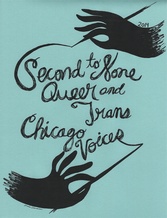| « Get on This, Daryl Brown (son of James Brown) at City Lit Books | Uncanny Magazine Wants You To Rethink The Familiar » |
Events Mon Aug 11 2014
"Second to None" Broadcasts and Archives the Voice of Queer Chicago
 Throughout a number of works, local writer and artist H. Melt has made a project of documenting the intersections of Chicago's history with the lives of its often overlooked transgender and queer communities. Just last year they (Melt's preferred personal pronoun) published SIRvival in the Second City, a collection of poems that emerged from within and around queer institutions such as Dyke March and Big Chicks. This month, Melt opens up the floor with the release of compilation zine Second to None: Queer and Trans Chicago Voices. It debuts with a reading and celebration this Wednesday, August 13, at Women and Children First (5233 N. Clark), at 7:30pm.
Throughout a number of works, local writer and artist H. Melt has made a project of documenting the intersections of Chicago's history with the lives of its often overlooked transgender and queer communities. Just last year they (Melt's preferred personal pronoun) published SIRvival in the Second City, a collection of poems that emerged from within and around queer institutions such as Dyke March and Big Chicks. This month, Melt opens up the floor with the release of compilation zine Second to None: Queer and Trans Chicago Voices. It debuts with a reading and celebration this Wednesday, August 13, at Women and Children First (5233 N. Clark), at 7:30pm.
Melt seems to have curated Second to None from a place of both love and frustration. They note in the preface that "While Chicago is home to many organizations that provide social, medical, and legal services for queer and trans people, there is not enough support for writers and artists, which often forces them to move elsewhere. Our thriving, underground culture is often overlooked outside of the city." And yet, in the experience of assembling this collection, "a critical queer, nonfiction literary voice has emerged that is strongly rooted in Chicago. Several themes connect these pieces, including the need to talk more openly about race, class, and privilege, the power of community support, and of course, the experience of living in Chicago itself."
The voices Melt finds are often fascinating. There's queer archivist Jakob VanLammeren talking about the Fireside Bowl's punk past (which this former punk heard tantalizing rumors of growing up on the other side of the lake) and "counterpublic memories." There's Alexis Martinez, who grew up as a male-assigned child in the Harold Ickes Homes in the 1950s and '60s but nonetheless had the courage to insist on her female identity from an early age. In a rich slice of oral history, she recounts a youth spent hiding away in Lincoln Avenue motel rooms to change into women's clothes while appearing publicly as a "hyper male" Mexican-Apache member of a Chinese street gang--which is just the beginning of a remarkable life story compacted into a few pages.
Melt seems to be coming into their own as an oral historian as well. They interview the founder of the queer arts collective 3rd Language, Amina Ross, about a series of arts workshops she created specifically for queer people of color--which seem to have been both revitalizing and frustrating, since the gallery space they borrowed turned out to be hosting artwork modeled on a cringe-inducing blend of (in the gallery's words) "Eastern philosophy, Native American rituals and American skate culture."
Born in New York, Ross (who will read Wednesday) finds cause for the perpetual exodus of talented young, queer people of color not just in the lure of coastal cities but in the uneasy racial structure of Chicago. She says, "As a person of color here, I didn't know what it was like to live in America until I came to Chicago. . . Racism exists in New York but I did not feel the depths of my blackness and how other I am until I moved here . . . I talked to other artists of color who've said they can't be here for too long, it's really trying on their souls."
Projects like Second to None can probably not do much to soften that structural sense of alienation. Instead, the collection works against the city's barriers from the other side. By writing where they write, as who they are, its voices say to Chicago: I am part of you. Know me, in all my complexity. In one essay, Kiam Marcelo Junio, who performs as the post-colonialist burlesque fantasia Jerry Blossom, gently takes to task a DNAinfo Chicago reporter who sought to reduce that complexity into the story of a Navy vet dressing up as a "feisty Filipino woman."
In closing, Junio writes: "I'd like to share my belief in the necessity and the urgency to continue learning, to speak out loudly, to clarify, to take ownership of our representations, and continue to share our journeys." Junio and the other vibrant voices of Second to None will be sure to continue that work at Wednesday's celebration, but if you can't make it, you're still in luck. The zine will be stocked by Quimby's and Women and Children First--plus, it's meant to be issue number one, so with any luck there'll be more installments to come.









